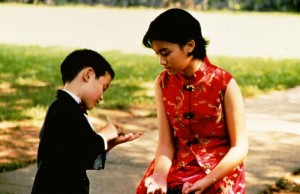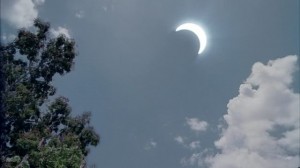
I try to watch this movie about once a year, and every time, I see something new to admire in it. It's hard to sum up, because it has so much in it, but Reverse Shot has written a really good article on it.
2. What Time Is It There? (Tsai Ming Liang)
Its humor and its sadness seem interconnected, or seem to flourish from the same place, making both emotions more painful. A film about alienation, as only the Taiwanese can do it. When I saw it last, I wrote this review:
A re-watch. This time, the movie was less funny, but more tender, and even sadder than before. I was struck by the sadness of seemingly awkward private gestures, the girl stuffing her face with crackers and bananas in a hotel room in Paris… the mother masturbating with the container of her dead husband’s ashes. The silence is not really silence but tapestries of odd rhythms. Sounds emanating from all corners to penetrate and intrude the characters. In fact, everything is a form of penetration while on the surface looking rather harmless: penetration as a substitute for connection. I was also a bit surprised by how much I related to the girl this time, more so than the other two characters. I thought her scenes were the saddest and most awkward. I imagined the movie as a musical composition (keeping tune to the odd beat of a watch being smashed against the railings) with 3 different parts (bass, alto, tenor?) played by the three different characters, all separate (and separated) but in synch, crescendoing almost literally as all three are brought to a sexual climax, although one that is illusively disappointing, perhaps inherently so because of what they’re expecting from it: human connection. And yet these three musical parts always remain alone. The last shots of this movie are some of the most memorable and affecting I have seen, with the father walking into a sunset… or what stands for a sunset in this movie: the carousel in the fairground, perhaps the same fairground that 400 Blows was shot, when Jean Pierre Leaud was pushed against the wall.
3. Syndromes and a Century (Apichatpong Weerasethakul)

Weerasethakul is one of the most promising new directors. I'm excited to see what he comes up with next. I wrote a short review of this movie on this blog before.
4. Bamako (Abderrahmane Sissako)
A film from Mali by a director I haven't seen enough of yet. One of the few movies I loved despite political themes being explicitly stated (here it is not preachy). I remember only the invigorating feeling of the narrative told in a jagged inventive manner, with all the energy of a new way of making movies.
5. Ten (Abbas Kiarostami)
A mother drives around town and has ten separate conversations. Kiarostami's digital camera focuses on half of the story at any one time, but delivers so much raw emotion from these performances.
6. Bemani (Dariush Mehrjui)
Can't find much on the internet; can't even find a decent screenshot. I saw this at the Iranian film festival at the High Museum a few years back. On the surface it was about a few women and their struggles, but the way it was told was what impressed me. I can't point to a single thing, but just the whole attitude and style towards filming reminds me of many other Iranian films where I feel like they are making movies for the first time, without relying much on staid conventions.
7. Innocence (Lucile Hadzihalilovic)
If you watch movies for mood, then run out and watch this. It's got plenty of story too: but one that is amorphous, mysterious, constantly on the line between creepiness and commonplace. Is it an allegory? A fairy-tale? A dream?
8. 2046 (Wong Kar Wai)
A sequel, of sorts, to In the Mood for Love. The first time I saw it I didn't like it as much. ItMfL was a straight forward restrained love story. This movie, by contrast, was complicated and confusing. And what was up with those scenes of the future? But every time I watched it, I understood more of what was going on and loved it more as well. This is a wild tangled investigation of memory that grows on you the more you watch it. It is serpentine and layered and full.
9. Kandahar (Mohsen Makhmalbaf)
A film set in and about Afghanistan directed by one of my favorite Iranian directors. Really beautiful and depressing, it's hard to describe the feeling this movie gives me. Why am I even trying to write about any of these movies? They are all so hard to describe with these damn words.
10. Mulholland Dr. (David Lynch)
This film needs no description. You've probably already seen it and hate it.
11. The Visitation (Nathaniel Dorsky)
Screenshot Not Available.
One of the few shorts by Dorsky I was able to see at Andy Ditzler's Film Love. This one is "about" aliens!
Remaining on the West Coast (once again San Francisco, specifically), next is Nathaniel Dorsky, an artist whose devout approach to the cinematic image transforms daily sights and sounds into wondrous moments of reverential contemplation, embodied through the use of "polyvalent" montage, which seeks to "redirect editing away from the dialectics that energized the Russian films of the 1920s and from the narrative demands of pop cinema, toward a refinement of viewers' ability to perceive the subtleties of particular images and the complex webbing of interconnections between them." (A Critical Cinema 5 pg. 79)
12. All the Real Girls (David Gordon Green)
Quirky indie-flick about young people angst, but actually good. There's something amateur about it that I love, and something Terrence Malicky about the cinematography. Also, it has some seriously funny dialog.
13. Talk to Her (Pedro Almodovar)
Twisted love. Almodovar can be too heavy handed sometimes, or too dramatic, or his plots too contrived. But still, you gotta love this movie, which made me forget about all those flaws.
14. Half Moon (Ghobadi)
A surreal journey to find death, where moments of reality and moments of dream are indistinguishable in the vast landscape, and left open to interpretation. I loved this movie. Also from Iran. If you watch the YouTube video above, try to ignore that ugly name that scrolls across the screen. Whoever made that video put that in, but it wasn't in the movie.
15. Punch Drunk Love (Paul Thomas Anderson)
My favorite PT Anderson movie.
16. La Pianiste (Michael Haneke)
Brutal and depressing. Not for the squeamish. Isabelle Huppert gives a great performance. I really liked Cache by the same director, but one Haneke is enough for any list.
17. L'Intrus (Clair Denis)
Obscure as fuck, but really good if you're not too concerned with figuring out what everything means.
18. Inland Empire (David Lynch)
David Lynch at his scariest and rawest. I saw it in the theater when it came out and it was one of the most visceral experiences ever.
19. The Gleaners and I (Agnes Varda)
Agnes Varda makes movies like nobody else. Her charm is too big to be contained off camera, and in this documentary about the history and continuation of gleaning her stamp is all over, which is the way I like it.
20. Old Joy (Kelly Reichardt)
A subtle and slow film. Relaxing with just enough tension to form the tatters of a story. More films should be like this, where the story unfolds so organically from the characters, the scene, and the mood.
21. Profit Motive and the Whispering Wind (John Gianvito)
“The day will come when our silence will be more important than the voices you are throttling today.”
A simple concept and restrained execution. It’s a documentary with no voice-over narration; a chronological tour of important gravestones, from labor leaders to civil rights leaders to people who sacrificed themselves for these causes. These are mixed in with beautiful shots of trees rustling in the wind, and little pencil sketch animations. It sounds pretty lame in words, and perhaps for some it would be lame. It's definitely not for everyone. It lasts for an hour but I felt like it was only 20 minutes. I highly recommend you try it and see if it’s for you.
22. The Wayward Cloud (Tsai Ming Liang)
A sequel of sorts to What Time Is It There? in which things get a lot weirder. You'll never look at a watermelon the same way again. Oh yeah, did I mention there are musical numbers?
23. All About Lily Chou Chou (Iwai)
Japanese school kids can be mean. It's all those uniforms they're forced to wear.
24. Triplets of Belleville (Chomet)
Beautiful old-style animations, strange somewhat creepy story with an off-kilter sense of humor, and a happy ending. All you can ask for in a movie!
25. Five Dedicated to Ozu (Kiarostami)
This movie is five scenes, all with a static camera capturing things coming in and out of the frame. A good movie to meditate to.

1 comment:
Several of my favorite movies ever are on this list. Why am I bothering to say that. But it's true nevertheless.
Post a Comment